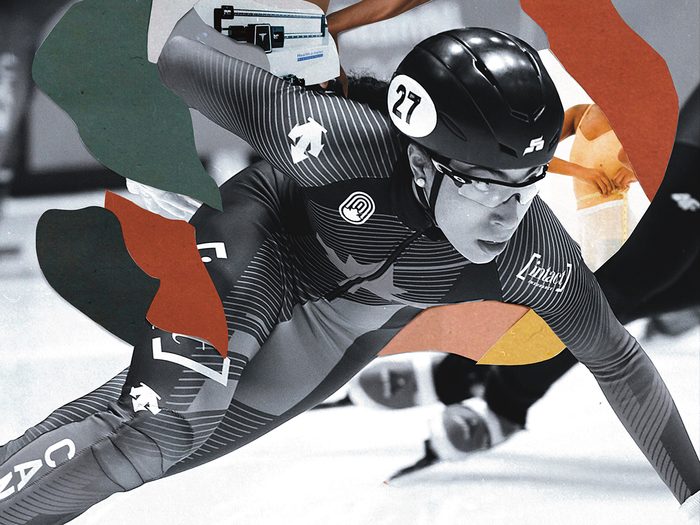Speed Skater Alyson Charles: “I Consider Myself Lucky”

Short track speed skater Alyson Charles, who is competing at the Beijing 2022 Olympics, shares her experience with body image issues in elite sports.
We used to get weighed in front of the entire team. That was an issue. When I first started competing as part of the national senior team in 2018, I had to get on a scale every day prior to a competition and write down my weight. We all did. That sheet of paper was visible to the whole team. It was a very uncomfortable practice. I remember at one point, I realized I was heavier than two of the men.
Body image, and the pressure to look a certain way, isn’t talked about in speed skating. I’ve never been asked about it in an interview before, but it’s something that affects many athletes.
Speed skaters tend to have huge thighs and a small upper body. I started speed skating at age five, and at times, because of the way my body developed because of my sport, I felt like I wasn’t feminine enough or I was too muscular. As a teenager, I saw girls at school and my teammates developing breasts and hips. I had none of that. It made me feel self-conscious, almost like less of a woman—especially because in skating, there’s no way to cover up. Our skin-tight suits show everything.
For a long time, the South Korean short track speed skaters were absolutely dominant. Most of their athletes were really slim, and that became the unofficial goal. When I got to higher levels of competition, the pressure to be lean intensified. If it was getting close to competition and I saw that I had gained weight, I would feel anxious. It could’ve just been that I drank more water that morning or didn’t go to the bathroom right before testing. But in my mind, I worried that a few added kilos might slow me down. Or maybe that extra weight would let my team down because in relays we physically push each other.
Looking back, it’s easy to see how practices like seeing the weights of all your teammates can make you self-conscious. I’ve had moments where I compare myself to other skaters, thinking, if I had less body fat or if I had a six-pack like hers, maybe I would be stronger. I consider myself lucky to have always been surrounded by a good group of professionals and teammates. I never got offhand remarks from them about my weight or my physical appearance.
In fact, talking to other athletes, either from my sport or in other sports, helped me feel less alone. They struggled with the same pressures and self-consciousness that I did. Other speed skaters have told me about coaches that really focused on their weight, even though they ate well.
A former figure skater, who is also Black, told me about the discrimination she faced from judges. She had to work harder and be better to make it. Thankfully, I didn’t feel like that in my sport. Everything’s objective, you either finish first or you don’t.
When I made the national team, I started to realize that different body types can be successful in speed skating. I saw other girls who were tall like me, and had figures like mine, in my sport—and it helped me feel normal. With athletes from Europe, the U.S. and Canada excelling in short track, the podium at the world championships and even the Olympics is much more diverse now in terms of body shape and weight. We are starting to see that athletes don’t have to be small and skinny to win.
There have also been changes with how we train. Women on the speed skating team spoke up about how uncomfortable being weighed, and the public recording, made them feel. Now, we still get weighed, but our numbers are kept private. And the coaches are not allowed to comment on the numbers anymore. That input is reserved for the dietitians and nutritionists we work with.
It’s heavy to carry around these insecurities and I feel that a lot of young girls that are in elite sports are going through that. For myself, as I grew older, I understood that I am perfect the way I am. My physical appearance doesn’t define me because I know what I am capable of. I am strong.
This essay is part of Best Health’s Body Talk package exploring the issue of body image in elite sports. Read more about the experiences of current and former Winter Olympians and Paralympians, and what is being done to make sports a safer space for all athletes, here:
“Fat Doesn’t Fly”: Inside the Culture of Body Shaming in Figure Skating
Paralympian Brittany Hudak: “I Didn’t Think About Body Image Until I Became an Elite Athlete”
Bobsledder Cynthia Appiah: “I Looked Phenomenal, but I Felt Absolutely Terrible”
Alpine Skier Erin Mielzynski: “I Was Just Trying To Be Perfect”
Olympic Legend Catriona Le May Doan: “I Worried About How People Viewed Me My Whole Career”
Get more great stories delivered straight to your inbox by signing up for the Best Health Must-Reads newsletter. Subscribe here.




